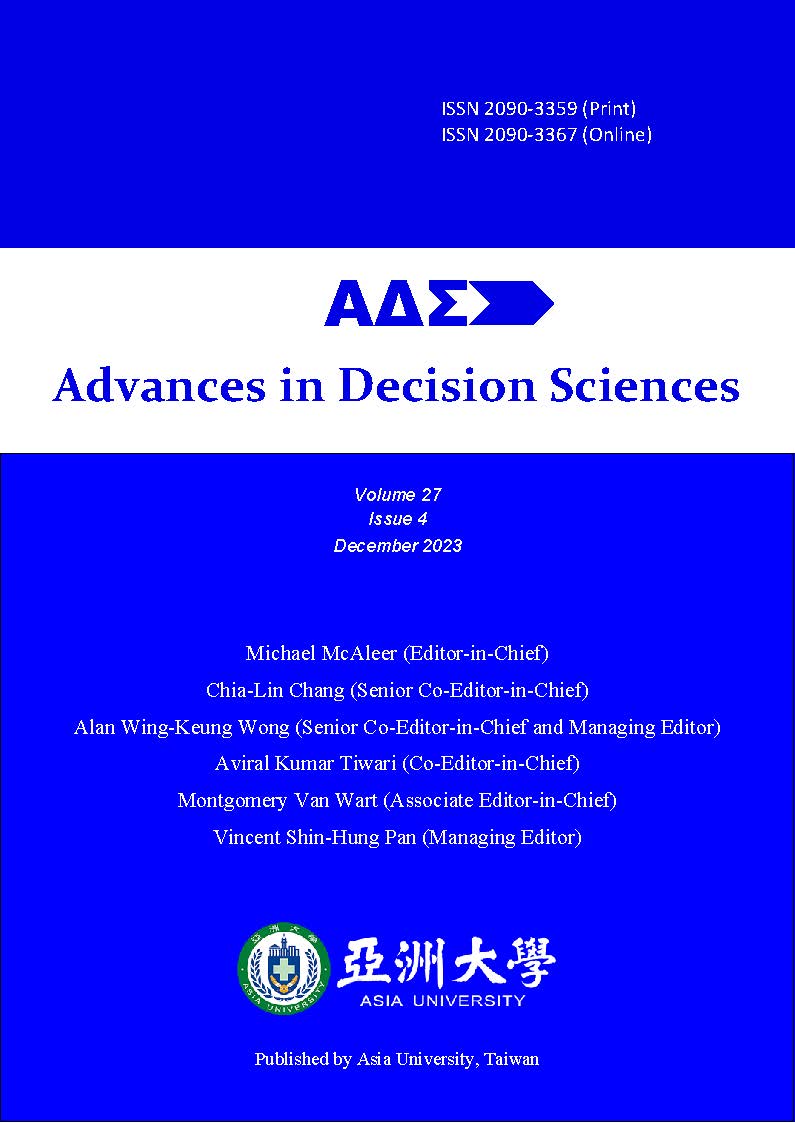Stock market Reaction to General Election in Pakistan: An Event Study Methodology
DOI:
https://doi.org/10.47654/v27y2023i4p90-113Keywords:
Event study, General Election, Pakistan Stock Exchange, constant mean model, Threshold GARCHAbstract
Objective: This study investigates the impact of the 2018 General Election on stock prices of firms listed on the Pakistan Stock Exchange (PSX).
Methodology: A sample of 34 listed companies selected from PSX and the KSE-100 index were used to investigate the impacts of the 2018 General Elections in Pakistan, on firms listed on the Pakistan Stock Exchange. We adopt the event study for analysis. The research timeline spans 120 days for estimation window, and 21 days for event window with the day after the General Election as the event date. The impact of the national elections is market-related. Hence, unlike the market model used in most of the previous studies, we use the constant mean model to calculate the abnormal returns. In addition to OLS, we apply the t-distributed threshold GARCH model to obtain more efficient parameter estimates in the context of fat tails and asymmetry in conditional variance of errors.
Results: The results of this study indicate a positive impact of the event (2018 General Election in Pakistan) on the sample of listed companies and KSE-100 index. This positive impact can be attributed to the stock market response to the favorable informational content of the general election outcome. The information is fully reflected in the stock market over about 3 days around the event date. Such fast response indicates the existence of semi-strong form of market efficiency in Pakistan stock market.
Implications: The empirical analysis presented in this research not only sheds light on the correlation between political events and stock market performance but also offers valuable insights for formulation of equity investment and portfolio management strategies. This study, therefore, serves as a vital contribution to the existing literature by providing innovative empirical evidence on the intricate relationship between political events, investor sentiment and stock prices in the specific context of Pakistan's 2018 General Election.
References
Adebayo, T. S., Saint Akadiri, S., & Rjoub, H. (2022). On the relationship between economic policy uncertainty, geopolitical risk and stock market returns in South Korea: a quantile causality analysis. Annals of Financial Economics, 17(1), 2250005
Argantha, I. P. A., & Sudirman, I. M. S. N. (2019). Stock market reaction to the event of Indonesia’s general election events in 2019. American Journal of Humanities and Social Sciences Research, 4(1), 202-208.
Ashraf, A., Hassan, M. K., Abbas, K., & Zaman, Q. U. (2020). Do firms harvest from political connections during general elections? Case of Pakistan. Journal of Financial Crime, 27(1), 258-273.
Audi, M., Sulehri, F. A., Ali, A., & Al-Masri, R. (2022). An event based analysis of stock return and political uncertainty in Pakistan: Revisited. International Journal of Economics and Financial Issues, 12(5), 39-56.
Bajwa, I. A., & Syed, A. M. (2022). A bibliometric review of the Pakistan Stock Exchange literature. International Journal of Entrepreneurship, 26(1), 1-10
Bash, A., & Al-Awadhi, A. M. (2023). Presidential elections and stock market outcomes: An event-study on the effect of Turkey's Presidential Elections on Borsa Istanbul. Cogent Economics & Finance, 11(2), 2265659.
Behera, A. D. (2018). Pakistan General Elections 2018: Clear signs of a guided democracy. International Studies, 55(3), 238-252.
Bera, A., Bubnys, E., & Park, H. (1988). Conditional heteroscedasticity in the market model and efficient estimates of betas. Financial Review, 23(2), 201-214.
Bhuvaneshwari, D., & Ramya, K. (2014). Impact of stock split announcement on stock prices. International Journal of Management, 5(3), 36-46.
Brogaard, J., Dai, L., Ngo, P. T., & Zhang, B. (2020). Global political uncertainty and asset prices. The Review of Financial Studies, 33(4), 1737-1780.Chavali, K., Alam, M.,
Chang, C. L., McAleer, M., & Wong, W. K. (2018). Decision sciences, economics, finance, business, computing, and big data: Connections. Advances in Decision Sciences, 22(1), 36-94.
Chaudhary, G. M., Hashmi, S. H., & Younis, A. (2016). Does dividend announcement generate market signal? Evidence from Pakistan. International Journal of Economics and Financial Issues, 6(1), 65-72.
Chavali, K., Alam, M., & Rosario, S. (2020). Stock market response to elections: An event study method. The Journal of Asian Finance, Economics and Business, 7(5), 9-18.
Corhay, A., & Rad, A. T. (1994). Statistical properties of daily returns: Evidence from European stock markets. Journal of Business Finance & Accounting, 21(2), 271-282.
Crane, A. D., Koch, A., & Lin, L. (2024). Real effects of markets on politics: Evidence from US presidential elections. American Economic Review: Insights, 6(1), 73-88.
Engle, R. F. (1982). Autoregressive conditional heteroscedasticity with estimates of the variance of United Kingdom inflation. Econometrica, 50(4), 987-1007.
Fama, E. F. (1970). Efficient capital markets. Journal of Finance, 25(2), 383-417.
Fidiana, F. (2020). Market reaction on the announcement of elected president. Journal of Accounting and Strategic Finance, 3(1), 71-87.
Glosten, L. R., Jagannathan, R., & Runkle, D. E. (1993). On the relation between the expected value and the volatility of the nominal excess return on stocks. The journal of finance, 48(5), 1779-1801.
Hashim, N., & El Mosallamy, D. (2020). Presidential elections and stock market: a comparative study. Journal of Finance and Economics, 8(3), 116-126.
Hon, T. Y., Moslehpour, M., & Woo, K. Y. (2021). Review on behavioral finance with empirical evidence. Advances in Decision Sciences, Vol. 25, Issue 4, p.15-41.
Iqbal, J. (2012). Stock market in Pakistan: An overview. Journal of Emerging Market Finance, 11(1), 61-91.
Irshad, H. (2017). Relationship among political instability, stock market returns and stock market volatility. Studies in Business and Economics, 12(2), 70-99.
Islam, M. S. U., Wong, W. C., & Yusoff, M. Y. B. M. (2023). Types of political connections, election years, and firm performance in Pakistan: Moderating role of external monitoring. Cogent Business & Management, 10(2), 2224139.
Islam, S., Zubair, M., & Muhammad, I. (2019). An analysis of 2018 General Elections in Pakistan. Journal of the Research Society of Pakistan, 56(2), 191.
Jamroz, P., & Koronkiewicz, G. (2013). Stock market reactions to the announcements and executions of stock-splits and reverse stock-splits. Optimum Studia Ekonomiczne, 5(65), 34-50.
Javid, A. Y., & Ahmad, B. (2020). Event study and impulse indicator saturation analysis to assess reaction of terrorist and political events: Evidence from oil and gas sector of Pakistan. Journal of Quantitative Methods, 4(1), 77-98.
Kashif, M., Palwishah, R., Ahmed, R. R., Vveinhardt, J., & Streimikiene, D. (2021). Do investors herd? An examination of Pakistan stock exchange. International Journal of Finance & Economics, 26(2), 2090-2105.
Kimbrough, M. D., Paharia, N., Wang, X., & Wei, S. (2024). The brand value of earnings: An event study of consumer responses to earnings announcements. The Accounting Review, 99(3), 259-285.
Koulakiotis, A., Papapanagos, H., & Papasyriopoulos, N. (2016). Political elections, abnormal returns and stock price volatility: the case of Greece. Investment Management and Financial Innovations, 13(1), 161-169.
Lausegger, M. (2021). Stock markets in turmoil: political institutions and the impact of elections. Economics & Politics, 33(1), 172-204.
MacKinlay, A. C. (1997). Event studies in economics and finance. Journal of Economic Literature, 35(1), 13-39.
Maitra, D., & Dey, K. (2012). Dividend announcement and market response in Indian stock market: An event-study analysis. Global Business Review, 13(2), 269-283.
Mehta, A. M., Sohail, A., Rehman, S. U., Naqvi, F. N., & Sair, S. A. (2020). Pakistan's political economy and stock market returns. Academy of Accounting and Financial Studies Journal, 24(4), 1-10.
Memon, B. A., Yao, H., & Tahir, R. (2020). General election effect on the network topology of Pakistan’s stock market: network-based study of a political event. Financial Innovation, 6, 1-14.
Nadig, A. (2015). An empirical study of stock split announcements of Select BSE Sectors using event study methodology. SDMIMD Journal of Management, 6(1), 1-12.
Naveed, M., Sindhu, M. I., Ali, S., & Wong, W. K. (2023). To invest or not to invest? Determinants of low stock market participation: Qualitative perspective from Pakistan Stock Exchange. Advances in Decision Sciences, 27(1), 113-171.
Oehler, A., Walker, T. J., & Wendt, S. (2013). Effects of election results on stock price performance: evidence from 1980 to 2008. Managerial Finance, 39(8), 714-736.
Osuala, A. E., Onoh, U. A., & Nwansi, G. U. (2018). Presidential election results and stock market performance: evidence from Nigeria. Applied Economics and Finance, 5(2), 117-124.
Prakash, A. S. (2013). Event study test of incorporating earning announcement on share price. Journal of Economic and Finance, 2(1), 9-18.
Putri, D. N., Sadalia, I., & Irawati, N. (2020). Analysis of LQ45 stock market index reaction on Presidential Election 2019. International Journal of Research and Review, 7(3), 463-472.
Ratnaningsih, N. M. D., & Widanaputra, A. A. G. P. (2019). The reaction of Indonesian capital market to political event the announcement of Indonesia Presidential Election 2019 results: event study on KOMPAS 100. International Research Journal of Management, IT and Social Sciences, 6(6), 87-94.
Raza, S., Baiqing, S., Kay-Khine, P., & Ali Kemal, M. (2023). Uncovering the effect of news signals on daily stock market performance: An econometric analysis. International Journal of Financial Studies, 11(3), 99.
Repousis, S. (2016). Stocks’ prices manipulation around national elections? An event study for the case of Greek banking sector. Journal of Financial Crime, 23(2), 248-256.
Riaz, K., Sheikh, M. R., Hussain, I., & Mushatq, M. I. (2023). Cash flows, earnings, and dividend payout nexus in Pakistan: A case study of KSE-100 Index. Audit and Accounting Review, 3(1), 101-124.
Rochimah, A., & Yuliana, I. (2024). Eleven sectors’ reaction to the political event 2023: evidence from Indonesia Stock Exchange. Journal of Accounting and Investment, 25(2), 526-550.
Rosario, S., & Chavali, K. (2016). Market reaction on dividend announcement in Oman-An event study methodology. International Journal of Economics and Financial Issues, 6(1), 103-108.
Roy, G., & Khan, M. A. (2021). Does election impact on stock market returns in Bangladesh? Asian Finance & Banking Review, 5(1), 1-18.
Ruven, R., Azam, A. N., & Ferry, S. (2019). Impact of presidential election on Indonesian capital market: an event study analysis. Russian Journal of Agricultural and Socio-Economic Sciences, 91(7), 177-185.
Sagheer, F. (2019). The Impact of General Election 2018 on Stock Prices: Evidence from Pakistan, Master’s thesis, Pakistan Institute of Development Economics, Pakistan.
Sayed, O. A., & Eledum, H. (2023). The short‐run response of Saudi Arabia stock market to the outbreak of COVID‐19 pandemic: An event‐study methodology. International Journal of Finance & Economics, 28(3), 2367-2381.
Siddiqui, A., & Iqbal, A. (2020). Pakistan Stock Exchange and macroeconomic indicators: A case study of KSE 100 Index. Karachi University Business Research Journal, 1(1), 25-37.
Sulehri, F. A., & Ali, A. (2020). Impact of political uncertainty on Pakistan Stock Exchange: An event study approach. Journal of Advanced Studies in Finance, 11(2), 194-207.
Suleman, M. T. (2012). Stock market reaction to good and bad political news. Asian Journal of Finance & Accounting, 4(1), 299-312.
Syed, A. M., & Bajwa, I. A. (2018). Earnings announcements, stock price reaction and market efficiency–the case of Saudi Arabia. International Journal of Islamic and Middle Eastern Finance and Management, 11(3), 416-431.
TajMazinani, M., Hassani, H., & Raei, R. (2022). A comprehensive review of stock price prediction using text mining. Advances in Decision Sciences, 26(2), 116-152.
Tisdell, C. A. (2018). Diversity in economic decision-making and behaviour: A new brief review. Advances in Decision Sciences, 22(A), 351-368.
Volodin, S. N., Kuranov, G. M., & Yakubov, A. P. (2017). Impact of political news: Evidence from Russia. Scientific Annals of Economics and Business, 64(3), 271-287.
Wong, W. K., & McAleer, M. (2009). Mapping the Presidential Election Cycle in US stock markets. Mathematics and Computers in Simulation, 79(11), 3267-3277.
Woo, K. Y., Mai, C., McAleer, M., & Wong, W. K. (2020). Review on efficiency and anomalies in stock markets. Economies, 8(1), 20.

Published
Issue
Section
License
Copyright (c) 2024 Advances in Decision Sciences

This work is licensed under a Creative Commons Attribution-NonCommercial 4.0 International License.







 Scientific and Business World
Scientific and Business World